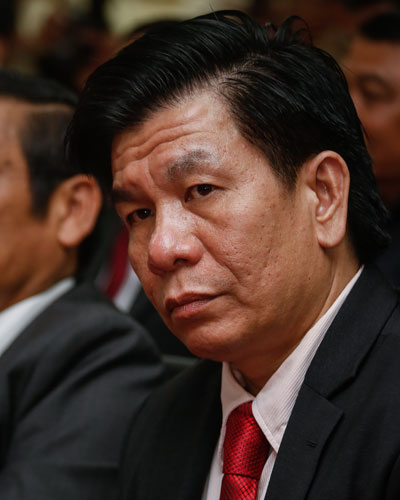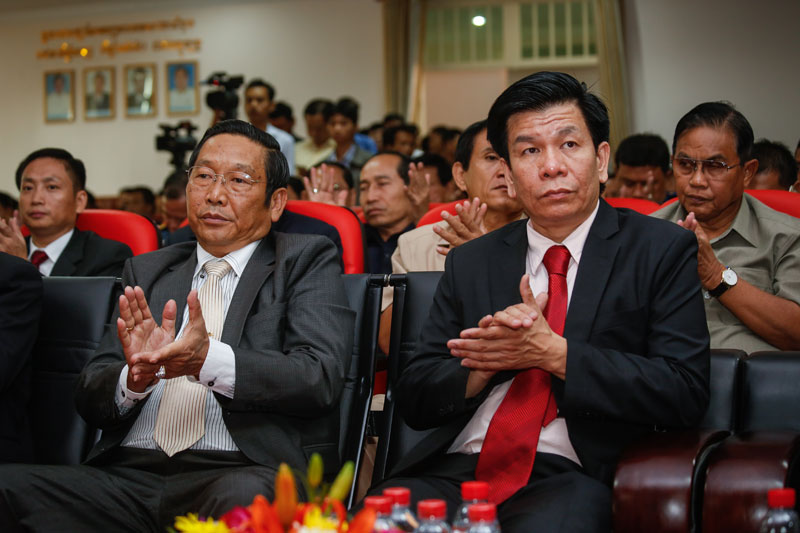In the highest-profile sacking since Prime Minister Hun Sen promised to rid the government of corruption after the CPP’s shock losses in the July 2013 election, the Phnom Penh Municipal Court’s chief judge was removed this week amid claims that millions of dollars had reversed a bail verdict.
The decision on Tuesday, revealed only hours after Mr. Hun Sen publicly claimed that $5 million might have helped secure the sudden release of the parents of fugitive general Thong Sarath, who faces murder charges, was hailed as a rare victory in the government’s otherwise tepid anti-graft campaign.
–News Analysis

With former municipal court deputy director Taing Sunlay becoming the city’s new top judge, and the deposed and sullen Ang Mealaktei finally placed under investigation after years of swatting away serious corruption claims, the government’s message was that it had purged graft from its ranks.
“A number of people have joined to celebrate after hearing about the removal of the chief of the Phnom Penh court,” Council of Ministers spokesman Phay Siphan said on Tuesday. “What he does—what he did—was according to his discretion, not according to due process and not according to the law.”
Yet Judge Sunlay’s pledge to lead the court in a less corrupt direction—“to defend the people’s interests and to respect professional ethics,” as he said upon taking up the post Wednesday—stands little chance against a court system that survives on patronage and bribery, according to opposition lawmaker Son Chhay.
“Things will not change. We have had this experience many times over in the past when some person is unexpectedly appointed to a high position and gets too excited, promising to perform better, but then we never see any actions following through on their commitments,” Mr. Chhay said Thursday.
“There will be more disappointment if we think it will be different now, because [Judge Sunlay] will still act on behalf of the CPP, and will be ready whenever the party wants to put more pressure on the opposition. In the meantime, he will find ways to make more pocket money from the system,” he said.
Moeun Tola, head of labor affairs at the Cambodian Legal Education Center, said the country’s judges thrive and perish based on their ability to work political networks.
“It’s impossible for any judge to operate based on their professionalism. In this country, I think the new leader of the court will be very careful, and all indications are they will continue to wait for instructions from politicians,” Mr. Tola said.
“We can clearly see that the court system in Cambodia is completely corrupted and politically influenced, especially by the top political leaders,” he said.
Controversial Career
Judge Sunlay has a patchy professional history, handing down controversial decisions in high-profile cases at the three courts where he has worked since graduating from the Royal Academy of Judicial Professionals in 2005.
After serving at the Preah Sihanouk Provincial Court and then, beginning in late 2009, at the Appeal Court, Judge Sunlay arrived as deputy director at the Phnom Penh Municipal Court in April last year—at the same time Mr. Mealaktei arrived as director from the Banteay Meanchey Provincial Court.
While at the Preah Sihanouk court, Judge Sunlay decided to overturn the initial conviction handed down to Stanislav Molodyakov, better known as Alexander Trofimov—the former director of the Koh Puos Investment Group, which was building a $300 million resort in Sihanoukville—who was initially found guilty of sexually abusing 18 underage girls.
“He was the presiding judge against the Trofimov case, and he issued a decision reversing the guilty verdict for the purchase of child prostitution, which carries a maximum sentence of 15 years, and changed it to [a charge of] indecent acts, which carries a maximum period of three years,” Samleang Seila, country director of child protection group Action Pour Les Enfants, said Thursday.
“We did not understand why this decision was made.”
Mr. Seila said Judge Sunlay had put aside the testimony of child victims in the case, who said they were sexually penetrated by Mr. Trofimov, and instead accepted the businessman’s testimony that he had only engaged in indecent touching.
“Trofimov’s testimony was that there was no penetration; he said it was only touching, but touching for money is still the purchase of child prostitution,” Mr. Seila said. “The Appeal Court later overturned his decision, and sentenced him again to eight years for the purchase of child prostitution.”
At the Appeal Court, Judge Sunlay in June 2013 upheld a widely derided decision to convict prominent housing rights activist Yorm Bopha over her involvement in the assault of a tuk-tuk driver. He later turned heads for his handling of the case against former Bavet City governor Chhouk Bundith, who shot three garment workers during a protest in February 2012.
Mr. Bundith, who remains in hiding, filed an appeal against the guilty verdict against him and the accompanying 18-month sentence. Judge Sunlay upheld the sentence, but added a surprising caveat.
“The court understands that Chhouk Bundith did not intend to shoot the three workers because he did not know those workers,” he said during the November 2013 appeal hearing.
More recently, at the Phnom Penh Municipal Court, Judge Sunlay has repeatedly denied bail to opposition officials charged with “taking part in an insurrection” at a protest in Phnom Penh’s Freedom Park in July. In December, he refused to allow three opposition lawmakers to sit in the public gallery at such a hearing, noting their unprosecuted charges of “leading an insurrection.”
Judge Sunlay declined to comment on most of his more controversial rulings Thursday, but said his decision to change Mr. Molodyakov’s charges involved wide consultation.
“While I worked on this, I held meetings with all officials to discuss among ourselves the court’s work,” he said.
Official Optimism
Although Judge Sunlay was Mr. Mealaktei’s deputy when the irregular decision was made to grant bail to Major General Sarath’s parents earlier this month, Mr. Siphan, the government spokesman, rejected the notion that he was in any way involved.
“The active person was Ang Mealaktei. He has seen the abuses of Ang Mealaktei, and this will not happen under his leadership. Now he sees he has a chance to fix the nightmare of the court and to prove this is the court of the people,” Mr. Siphan said Thursday.
Sam Pracheameanith, secretary-general of the Supreme Council of the Magistracy, the body that officially ousted Mr. Mealaktei, said he was confident that Judge Sunlay would lead the court away from a culture of graft and impunity.
“He is a teacher at the Royal Academy for Judicial Professionals…[and] he was a good student, also going to study abroad in countries like Japan,” Mr. Pracheameanith said.
“He works hard and is a very strict person,” he added.
Attorney Sok Sam Oeun, who frequently represents defendants in political cases at the Phnom Penh court, said the promotion of Judge Sunlay to court director was unlikely to change the court’s day-to-day adherence to procedure.
“For political cases, there is not much independence. But in normal cases, there is [independence], and it depends on the cases. I have had many cases that the judges make decisions that are very fair, and other decisions not so fair—not all cases are bad. In some cases, they do try to find justice,” he said.
“If we look at this case [of Mr. Mealaktei’s removal], which started with the release of Thong Sarath’s parents—and not with any focus on corruption—it looks only political, and was intended to reduce criticism because this decision was criticized.”




